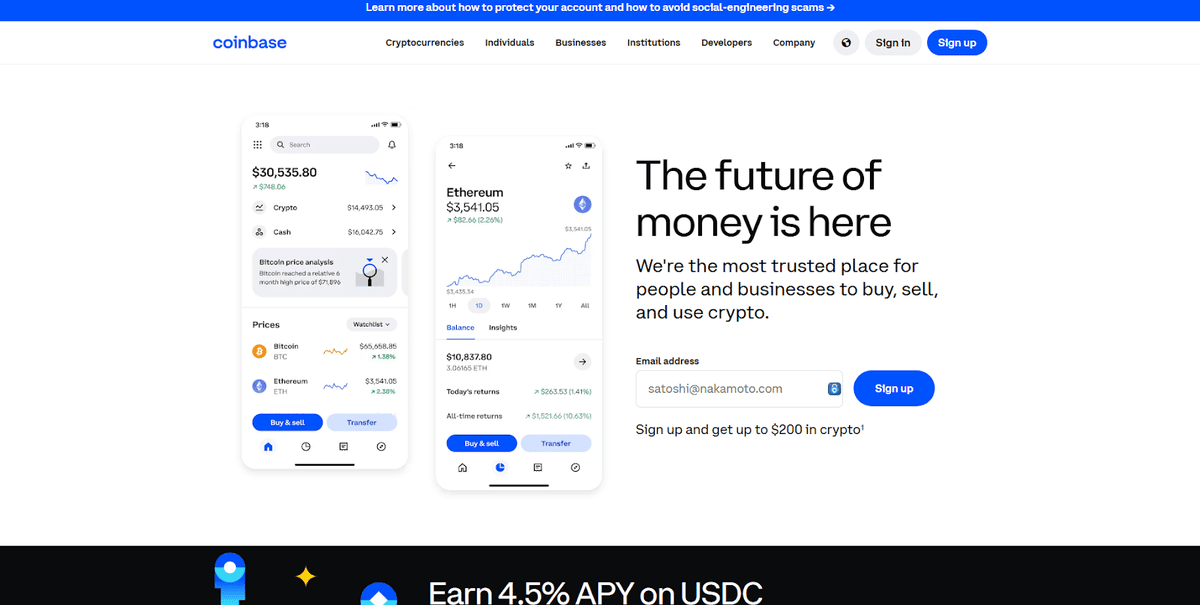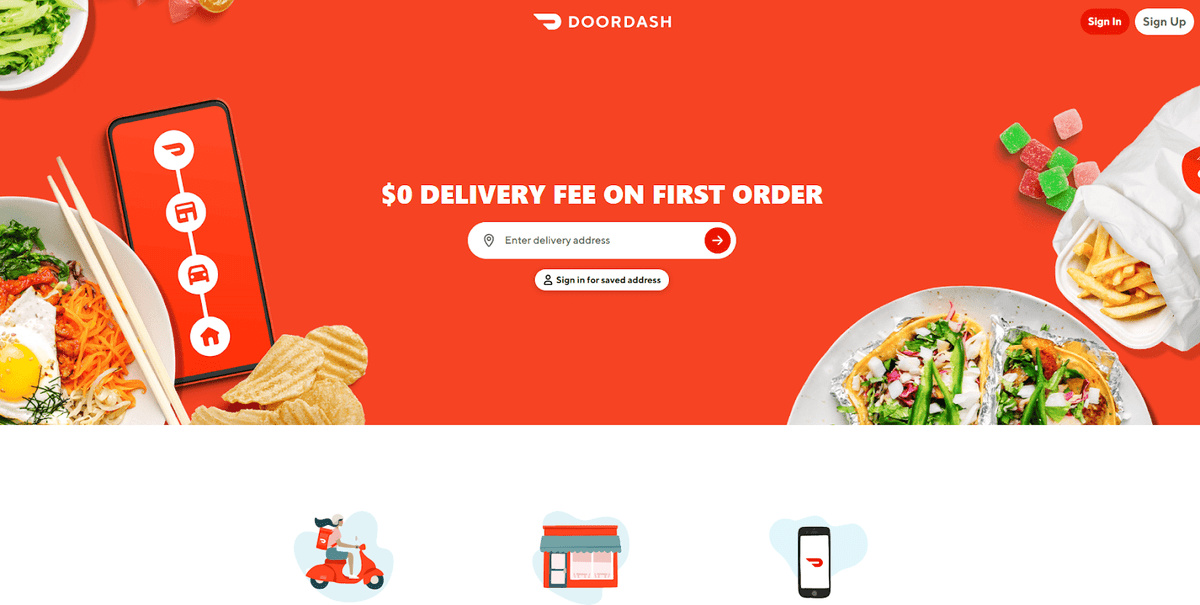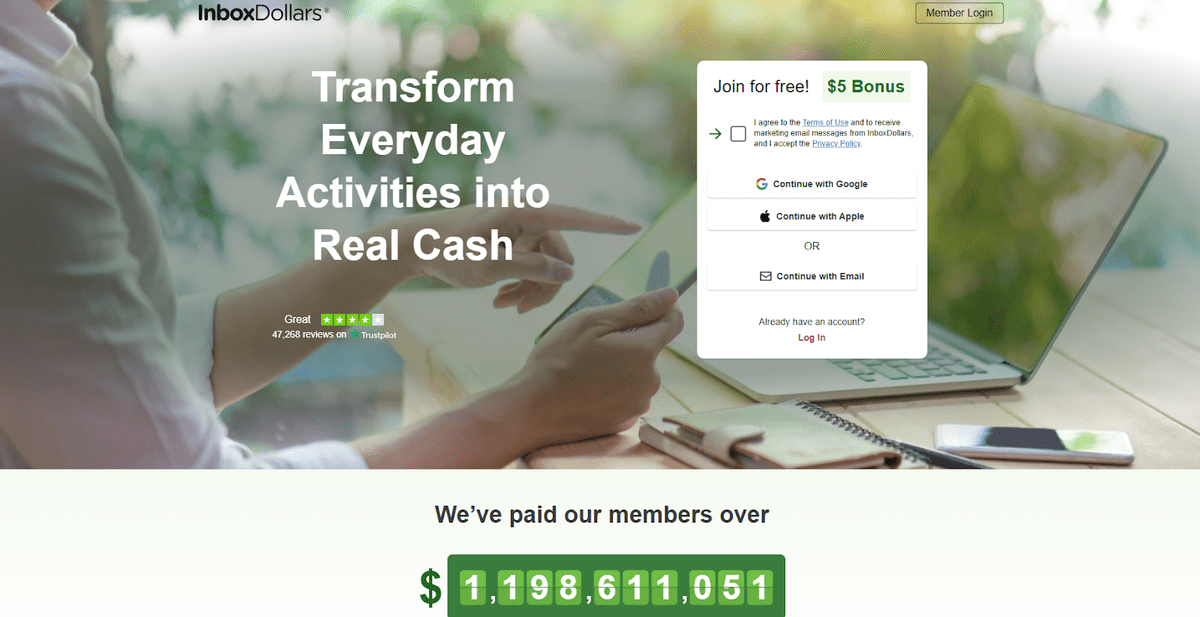Is Alibaba a Scam?
Laura Martisiute
Reading time: 8 minutes
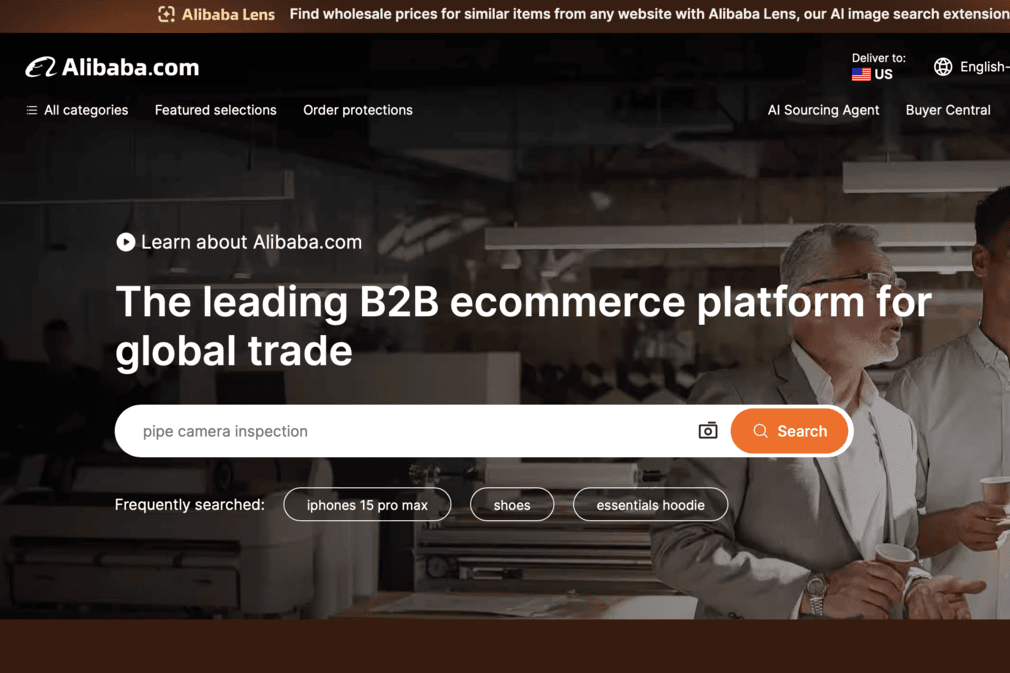
Table of Contents
If you’re thinking of using Alibaba, you need to know: Is Alibaba a scam?
Below, we explain whether Alibaba is a scam and discuss some steps you can take to improve your safety when using this website.
What Is Alibaba?
Alibaba (not to be confused with AliExpress) is a Chinese tech company.
Though the company is involved in many different industries (e.g., digital media, cloud computing), it’s most well-known for its B2B wholesale platform, i.e., alibaba.com.
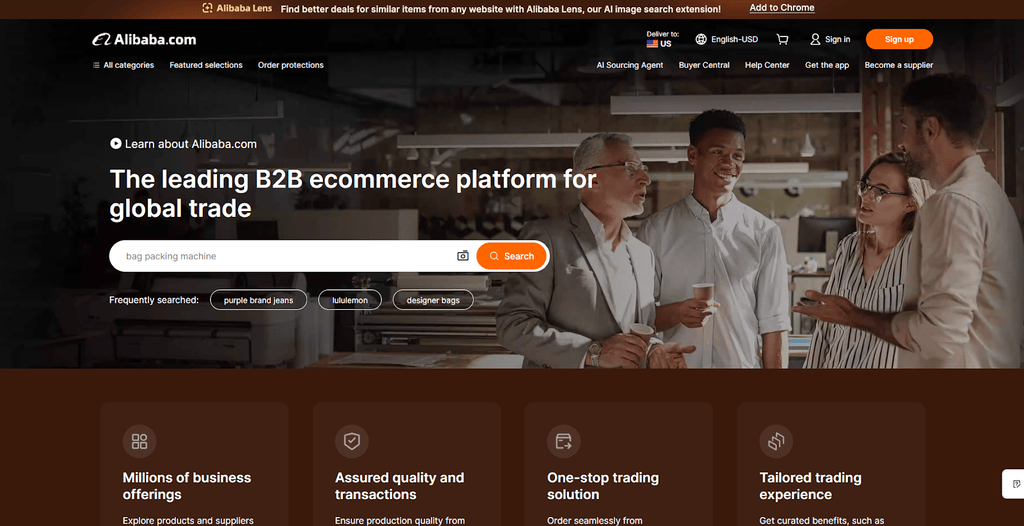
Alibaba.com connects suppliers with businesses and vice versa.
Suppliers (who are usually based in China) list their products on the Alibaba website, where they can be found by businesses (e.g., manufacturers, retailers, and startups) who want to buy items in bulk.
Typically, the larger the quantity you buy, the less you pay.
Many suppliers on the platform can provide customization, such as custom labels.

According to the website, Alibaba.com has more than 200 million products from over 200,000 suppliers.
Is Alibaba a Scam?
No, Alibaba is not a scam.
It’s a legitimate e-commerce platform that connects suppliers with businesses.
Alibaba.com gets mixed reviews from users:
- 4.1 out of 5.0 stars (from 26,082 reviews) on Trustpilot.
- 4.2 out of 5.0 stars (from 12,767 reviews) on Sitejabber.
- 2.6 out of 5.0 stars (from 40 reviews) on REVIEWS.io.
- 1.3 out of 5.0 stars (from 30 reviews) on the Better Business Bureau.
- 1.28 out of 5.0 stars (from 2,616 ratings) on MouthShut.com.
- 4.7 out of 5.0 stars (from 9,905 reviews) on ResellerRatings.
- 1.7 out of 5.0 stars (from 842 reviews) on PissedConsumer.
Most complaints are about suppliers who did not deliver the items ordered or delivered faulty items. People also claim that Alibaba often takes the supplier’s side despite the customers providing evidence.
Alibaba itself doesn’t sell products – it’s a marketplace where suppliers can list their items, and businesses can buy them.
As with any marketplace platform (e.g., eBay, Amazon Marketplace), it is possible to encounter scammers on Alibaba.
One Reddit user said: “Suppliers behind it [Alibaba] range from garbage to gold.”

Internet users recommend being cautious when buying on Alibaba. Specifically, to:
- Check store ratings and how long a supplier has been in business for.
- Choose “Verified” or “Gold” suppliers.
- Use Trade Assurance for buyer protection.
- Ask for samples before placing a big order.
- Use Alibaba’s payment system.
- Be aware of shipping and customs costs.
- Check the r/AlibabaSellerBadList for sellers and suppliers who reportedly rip people off.
Many also warn against placing orders that involve large sums of money due to Alibaba seemingly siding with the seller.
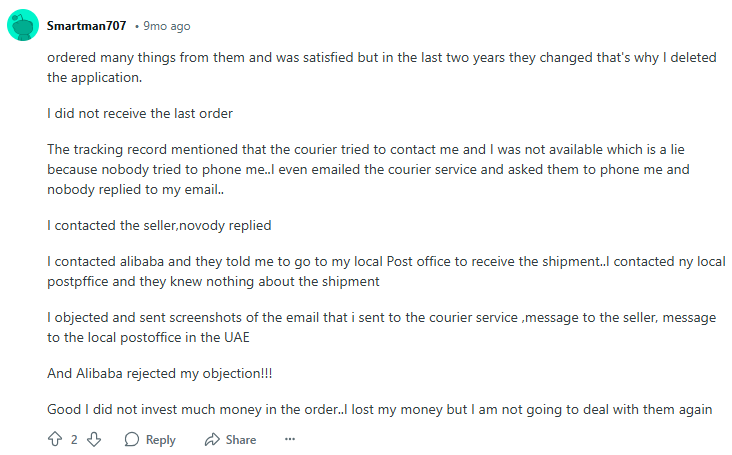
One person said: “Treat nothing as being “verified” or “assured”. Only buy what you can afford to loose.”
Alibaba is not Better Business Bureau accredited.
Buyer protection program
Ideally, you should buy from suppliers who are part of Alibaba’s Trade Assurance program.
Trade Assurance is basically Alibaba’s buyer protection program and is available to customers for free.
However, not every supplier is part of Alibaba’s Trade Assurance.
Look for a yellow badge or text saying “Trade Assurance” on the product page and/or supplier profile. Alternatively, when you search for products, filter by “Trade Assurance.”
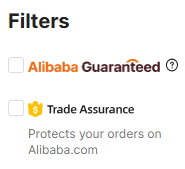
With Trade Assurance, you are potentially eligible for a refund (30 days for most buyers, 60 days for Enterprise users) if the terms aren’t met, with disputes mediated by Alibaba.
Trade Assurance does not guarantee a full refund, though, nor does it guarantee that Alibaba will side with you over the seller.
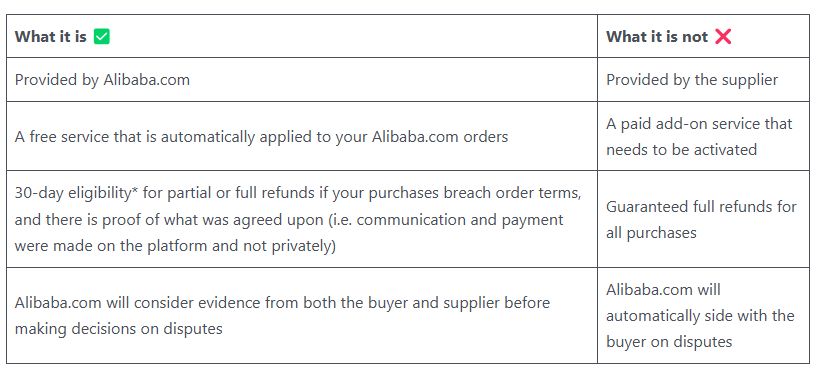
Inspection service
If you’re making a Trade Assurance order (see the section above), then you can also add an Inspection Service to have your order inspected before shipment.
According to Alibaba, your order will be inspected by an independent third-party inspector or company listed on the site.
The inspector will go to the manufacturing facility and report back with photos to certify that the products you bought meet the quality standards you’ve agreed to.
Returns
Some products qualify for “Easy Return,” which is Alibaba’s service that makes returning items easier.
If possible, buy items that are eligible for Easy Return. Note that the total value of the product can’t be more than $3,000, and the return must be related to issues with the product (e.g., incorrect materials or bad quality).
You can only make one Easy Return request per Trade Assurance order.
Security
Payments made through Alibaba are SSL-encrypted and PCI DSS compliant.
You can pay with credit card, debit card, PayPal, Google Pay, Apple Pay, Afterpay, Clearpay, and bank-to-bank wire transfers with escrow protection.
In its privacy policy, Alibaba says it uses “appropriate technical and organisational measures to prevent unauthorized access to the Platform, to maintain data accuracy and to ensure the correct use of the information we hold.”
It does not specify what these measures are.
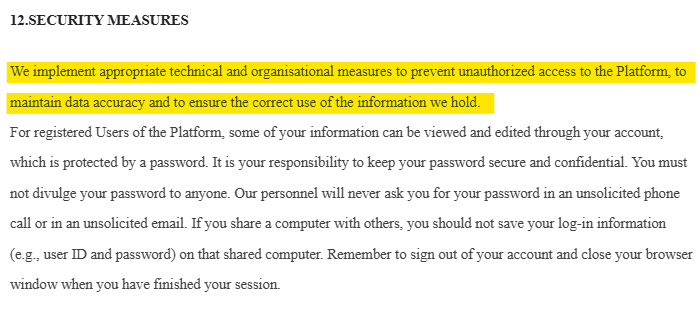
Privacy
In its privacy policy, Alibaba explains the kind of data it collects, why, and with whom it shares it.
It collects the following personal information about you directly from you:
- Contact information, e.g., name, address, phone number.
- Account information, e.g., username, password, gender.
- Business information, e.g., company name, tax registration.
- Transaction information, e.g., transaction statements, payments, and orders placed.
- Payment information, e.g., bank account number, credit card number.
- Device content, e.g., photos, calendar.
- Event information, e.g., names, phone numbers, email addresses.
It also collects certain information automatically, including device information, online activity information, location, communication information, marketing and advertising information, user-generated content, and other information (like statistics information about the platform).
Plus, it gets data about you from third parties, including social media, group companies and affiliates, verification check companies, etc.
Alibaba uses this data for account setup and admin, order processing, logistics, customer support, communications, dispute resolution, personalized marketing, fraud prevention, legal compliance, research, and development.
It may share it with other users (for transactions), Alibaba affiliates and group companies, service providers, marketing platforms, legal entities, and potential business acquirers.
The platform also says it might provide anonymized data to third parties.
Another thing to note is that the instant messaging feature on Alibaba comes from a partner app called DingTalk, which collects your chat information and shares it with Alibaba (for things like dispute resolution, fraud prevention, and improving the platform). This is fairly standard for business platforms, but means your chats may be monitored.
Alibaba will keep your data for as long as needed for business/legal reasons.
Data may be stored/processed in the US, Germany, Singapore, or China.
Terms of Service; Didn’t Read (ToS;DR), a project that rates internet services’ terms of service and privacy policies, gives Alibaba a “Grade E.” This means, “The terms of service raise very serious concerns.”
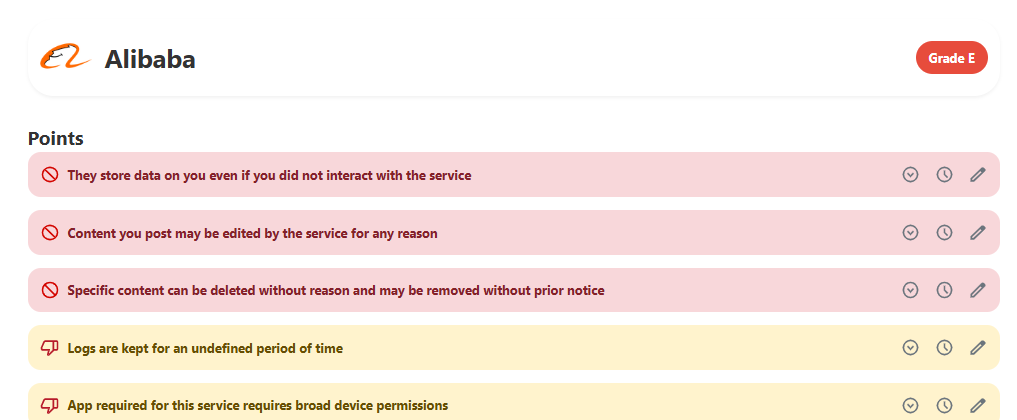
Among the (very) long list of concerns is the following:
- Alibaba stores your information even if you don’t interact with the service.
- It keeps logs for an unspecified time period.
- Its app requires broad device permissions.
- You need to provide identifiable information.
- It collects many different types of personal data.
- You have a reduced time period to take legal action against the service.
On the plus side, ToS;DR says that Alibaba provides information about how your personal data is collected and used and allows you to opt out of targeted advertising.
Similarly, the Common Sense Privacy Program gives Alibaba a “Warning” rating, meaning the service “Does not meet our recommendations for privacy and security practices.”

It says that Alibaba shares your personal information for third-party marketing, displays personalized advertising, and allows third parties to collect data for their own purposes. It also says users’ data is used to track and target advertisements on other third-party websites or services.
So, Should You Use Alibaba?
Depends.
Alibaba is a legitimate platform, but you still need to be wary of scams. It’s also not the best platform for privacy.
How to Use Alibaba Safely
- Create a strong password. And don’t reuse it elsewhere online.
- Use a masked or dedicated email. This can help keep your primary email inbox clean of spam.
- Buy products covered by Trade Assurance. Trade Assurance is essentially Alibaba’s buyer’s protection program. Note that not all products and suppliers are covered by Trade Assurance.
- Stay on the platform. Never move off the Alibaba platform to make a payment, as this voids your protection.
- Review the suppliers. Look for Verified or Gold supplier badges, check how many years they’ve been in business, and read the reviews.
- Don’t share sensitive information in chat messages. In-platform messaging is handled by DingTalk, which shares chat data with Alibaba. To stay on the safe side, keep discussions purely transactions and never share sensitive personal information like banking details, ID numbers, and business secrets.
- Be smart with app permissions. If you’re using the Alibaba app, only grant permissions it needs for you to use the service. Don’t give it permission to access your camera, mic, etc.
- Keep a record of all transactions. Doing so can help in case of a dispute.
- Start small. If possible, start with a small order to see product quality, delivery speed, and communication before placing a large one.
- Read the privacy policy. This is where Alibaba outlines the kind of data it collects, why, and with whom it shares it. The privacy policy also describes your privacy rights.
Our privacy advisors:
- Continuously find and remove your sensitive data online
- Stop companies from selling your data – all year long
- Have removed 35M+ records
of personal data from the web
Save 10% on any individual and
family privacy plan
with code: BLOG10
news?
Don’t have the time?
DeleteMe is our premium privacy service that removes you from more than 750 data brokers like Whitepages, Spokeo, BeenVerified, plus many more.
Save 10% on DeleteMe when you use the code BLOG10.

